Bateleur’s annual large sample National Employee Engagement Survey 2020, conducted last week, reports 12.6% more employees are engaged than when last measured in October 2019.
It seems that the shock of lockdown, and its unpleasant economic side-effects have jolted much of South Africa’s employment base into a state of heightened energy and workplace engagement.
Comparing last week’s survey to the October 2019 benchmark reveals these encouraging trends.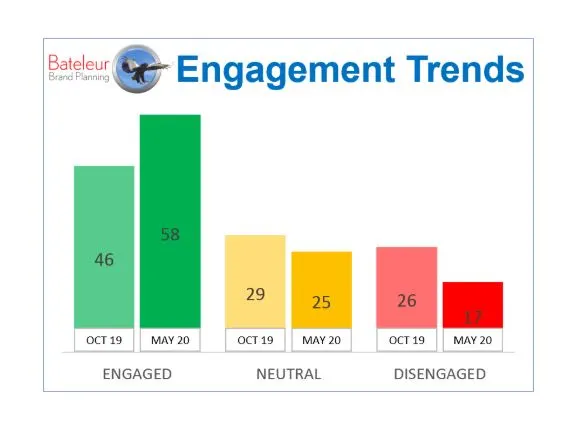
Readers who are interested in these employee engagement trends may request a comprehensive and complimentary report of the survey results here.
The Bateleur National Employee Engagement Survey 2020 comprises of 6 848 survey respondents who are resident in Southern Africa, employed and internet-enabled. The survey covers a widespread of demography, industries and employment positions.
Why is employee engagement important?
Before diving into survey highlights, it is worthwhile revisiting what employee engagement is, and why it is so important.
Engaged Employees are generally positive, committed, focused and motivated to achieve successful outcomes in each specific engagement opportunity. The overriding sentiment is “for the good of the company, with pride”. The “we” mentality.
Neutral Employees are mostly neutral, passive, freewheeling and happy to achieve ordinary outcomes in each specific engagement opportunity. The overriding sentiment is “for the good of me, with tolerance for the company”. The “I” mentality.
Disengaged Employees are inclined to be negative, dissident, distracted and apathetic in each specific engagement opportunity. The overriding sentiment is “I wish I were somewhere else, I dislike the company”. The “they” mentality.
Organisational rewards to be had by cultivating a workforce that is highly energised and engaged are immense and numerous:-
- Better employee engagement means better productivity! They work harder, smarter, are absent less often and less involved in accidents, incidents or activities causing timeout.
- Engaged employees are less wasteful! They are more conscious of wasting resources, and less likely to make mistakes that cause unnecessary costs.
- Engaged employees means more profit! Increased productivity + decreased wastage = increased profit!
- Engaged employees are less likely to resign! They will work for your company for much longer than disengaged ones increasing return on investment in training, increased experience and accordingly better productivity.
- Engaged employees are positive promoters! They are less likely to have negative things to say about the business. They are brand ambassadors.
- Engaged employees are happy in their work! They tend to be cheerful and promote good vibes within the company creating a contagious positive knock-on effect to co-workers and customers alike.
- Engaged employees communicate well! They are better at communicating with their peers, leaders and customers. They are generally adept at breaking down silos and creating mutual cooperation between the various functions in the business.
- Engaged employees are more innovative! They outclass their disengaged counterparts when it comes to bringing valuable ideas to the business
- Sustainable competitive advantage! Engagement is a difficult, slow, cultural transformation and, if achieved, by default renders sustainable competitive advantage. It will be hard for competitors to achieve overnight.
Why has engagement improved through lockdown?
The most obvious reason is job security! Lockdown has caused or threatened the loss of many jobs, which has no doubt increased a sense of importance of focusing on work to retain this privilege.
But there are other reasons.
Lockdown has come with its negatives, but it also provides an upside to many employees.
A full two-thirds of survey respondents have experienced working from home or remotely for the first time. Respondents report improved flexibility, productivity, cost reductions, increased creativity as well as an improved sense of trust and accountability with their managers as a consequence of being forced to work remotely.
Materially, many consumers have experienced tremendous savings in money usually spent on transport. Added to this, they now find themselves working in a comfortable, personalised work environment. Accordingly, more than half report reduce stress, improved health and more time for personal family matters as a result of working remotely.
It’s not all upside however, a fair amount, almost half, of survey respondents reported the problem of work life spilling over into home life. Technology troubles also affect many. Lack of physical contact with other staff members as well as distractions from people at home and corresponding cabin fever are suffered by a reasonable proportion of South Africa’s remote workforce, and are therefore a source of disengagement.
What does it feel like to be an engaged employee?
The Bateleur National Employee Engagement Survey 2020 unpacks key emotions attached to being engaged in the workplace.
To be an engaged employee means a life worth living!
Engaged employees are driven by the emotions of motivation, happiness, pride, inspiration, energy, commitment, excitement, joy and focus. What a way to wake up in the morning!
Employees who sit on the fence of neutrality find themselves driven by emotions such as feeling challenged, hopeful, thankful and content. Fence sitting, however, also provokes the negative sentiments of worry, reluctancy, nervousness, anxiety and unease. In their hearts, neutral employees are subconsciously aware of their vulnerability. Neutral employees spend their weekdays looking over their shoulders!
Disengaged employees live a life driven by anger, frustration, stress, lack of inspiration, lack of motivation, unhappiness, tiredness, stagnancy and boredom. What a way to spend weekdays!
Can one spot engagement in the workplace?
With great ease!
Following on from employees feelings, the survey goes on to unpack typical behaviours that are linked to engagement.
Engaged employees are the ones who go the extra mile, listen actively with an open mind, are not afraid to embrace new experiences, often suggest new ways to improve things, love to share their knowledge with their co-workers, are considerate and take an interest in other people, take responsibility for their actions without blaming others, speak positively about the company, show a keen sense of purpose in work and generally have a positive outlook on both life and work. They tend to project a feeling of energy.
By contrast, it’s easy to spot disengaged employees! They are the ones who constantly waste effort on irrelevant matters, fail to display curiosity and ask questions, love procrastinating, avoid participating in critical debate, tend to complain, often make sarcastic and destructive comments and are usually not very interesting to talk to. In addition, disengaged employees will often be found discussing corporate politics and gossiping. They tend to avoid greeting co-workers and hold grudges.
Does a personality drive engagement?
Most definitely yes!
The survey clearly identifies confidence, energy, dynamism, cheerfulness, innovativeness, self-motivation, proactivity, being organised and structured, as well as being focused and ambitious as key personality traits associated with an engaged employee.
The results were quite surprising in respect to which personality traits do not drive engagement. One would think that helpfulness, generosity, kindness, being considerate, friendly and polite, sympathetic and charming would be good engagement personality traits. But not so. They are merely hygiene factors expected of humanity.
Additionally, qualities of being analytical, tech-savvy, observant, independent, open-minded and adventurous are also personality traits revealed to be not associated with highly engaged employees.
What can managers do to improve engagement?
The short answer, lots!
The survey results reveal key management behaviours that are highly correlated with engagement.
Managers that give clear direction, provide strong mentorship, communicate clearly, give recognition and show appreciation, are open and transparent, trusting and in turn reliable and trustworthy themselves, stand a good chance of positively affecting engagement in their departments. Leading by example, inspiring confidence and creating a sense of team cooperation adds to this engagement. Paying attention to the personal needs of team members is also highly important for engagement.
By contrast, managers that fail to define desired outcomes clearly, who micromanage their teams, practice a closed door policy, fail to give feedback and discuss performance openly and who lack decisiveness are creating a breeding ground for disengagement.
It goes without saying, that a lack of civility and politeness destroys engagement!
Does culture drive engagement?
Without a doubt, corporate culture and policy are the underbelly of employee engagement!
Survey results highlight the most important driver of employee engagement to be a sense of feeling valued and that the company cares for employees.
Trust in good leaders who are modest and respectful, coupled with a sense of collaborative teamwork underscore this sense of power and energy.
Openness, transparency and a sense of equal opportunity are paramount for a culture of engagement.
Clear opportunity for personal career growth is a critical ingredient.
Are all engaged employees born equal?
Mostly, yes. But with some exceptions!
In many cases, we tend to look at demographic relationships such as location and age as underlying characteristics that might influence employee engagement. Detailed analysis of the Bateleur National Employee Engagement Survey 2020 has revealed interesting news in this domain.
There is a myth that Jo’burgers are highly motivated business-wise. The survey reveals that there are insignificant differences in engagement levels across each of the 9 provinces.

There is a strong and significant correlation between age and engagement. The older one gets, the more engaged we become! Many of us miss the frivolity of our youth!
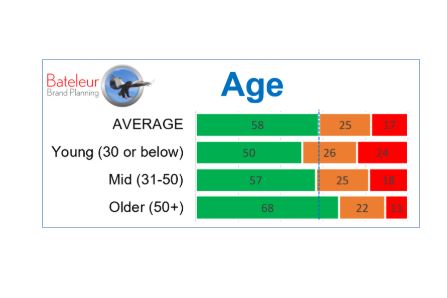
Surprisingly, and interestingly, there is little if any relationship between education and engagement. Employing someone because they are educated does not guarantee a backbone instead of a wishbone.
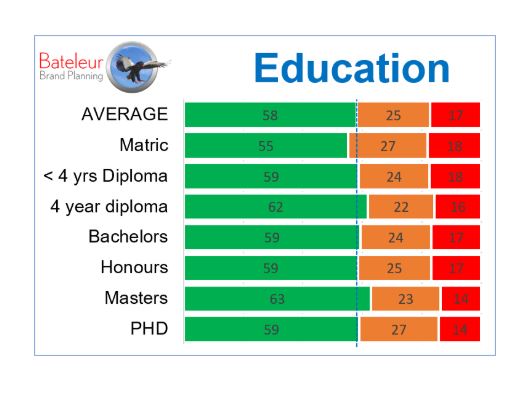
It comes as no surprise that business founders and directors tend to be highly engaged individuals, far more so than other employee positions.
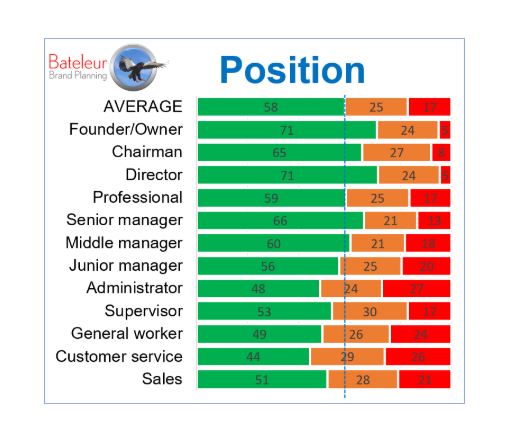
The research results support a fairly obvious truism that employees who are paid by way of commission, or their project contract fees, turned out to be far more engaged than those who earn a fixed salary or wage.
It is a sad indictment for us as consumers that employees in sales and customer service, as well as supervision, tend to clock in on the low side of engagement!
You may be wondering if there is a difference in engagement levels across industries. The answer is that there is, but marginally so. Accountancy, agriculture, social services, consulting, mining and travel and tourism industries more highly associated with engaged employees.
Conversely, the law enforcement, government services, telecommunications, retail and wholesale as well as legal industries come in below par engagement-wise.
Interestingly, the research uncovers a huge relationship between optimism about South Africa and being engaged in the workplace.
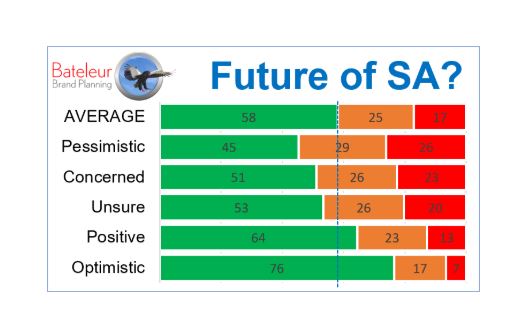
When recruiting, make sure that you attract fans of South Africa!
Conclusion
It is quite thrilling to see some good news off the back of lockdown. It was always a fairly sure hypothesis that lockdown would focus the minds of employees, and result in many pairs of socks being pulled up.
This survey proves this to be true.
Now is the time for businesses to capitalise on this positive energy, and take employee engagement to the next level to achieve profit and competitiveness in a post-lockdown world that will no doubt be tough, to say the least.
As a reminder, you can apply for a complete copy of this survey report here.
This is important …
Also, if you are curious as to how your company’s engagement scores compare to these national averages, then we will scientifically measure your company’s baseline staff engagement scores for you at no charge. You may find out more about this offer here.
It has to be onwards and upwards if we are to overcome our current health-risk and economic woes. Onwards and upwards requires highly energised and engaged employees! DM


















 Become an Insider
Become an Insider